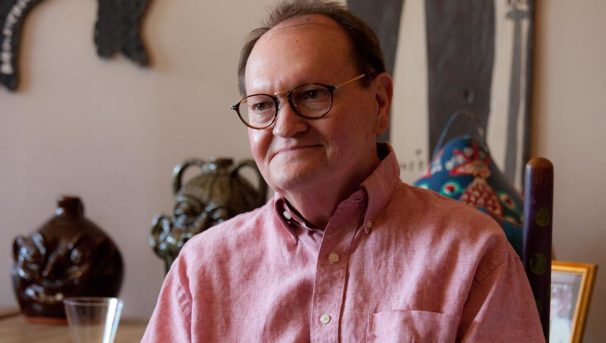Thank you for your generous support!
While this project has ended, you can still make a gift at https://umfoundation.com/ignite.
Week Four Update | John T. Edge
Dear Friends,
Our goal for the Charles Reagan Wilson Graduate Student Support Fund is within reach. To date, 151 donors have contributed $22,719. I am one of those donors.
I gave last week because I value the many contributions Charles has made to the study of the American South. I gave again, just now, because, in this pollen-dusted spring moment when semester deadlines loom, I remember what it was like to be a graduate student, caroming through archives, puzzling through thesis statements, grappling with the academic enterprise, trying to find my way.
I gave because I remember, specifically, an early encounter with Charles. I was three months into what is now a twenty-plus-year Oxford run. We were in the gym. Charles was peddling an exercise bike, reading the latest issue of Rolling Stone. I approached, befuddled. I asked an unintentionally ridiculous question, Why are you reading that? Charles, broadcasting that big, open, welcoming smile of his, said, I read Rolling Stone to keep up with my students.
It was a small moment. But it was a telling moment. The gesture spoke volumes about the ways Charles invested in students and the zeal he brought to academic inquiry.
Throughout his career, Charles devised innovative ways to ground serious academic spadework in the everyday lives of students and colleagues. Now it’s our time to give back, to honor his career by fully vesting a fund that supports graduate student research.
A generation of students has followed his lead. Now, it’s our time to catch up and keep up with Charles. Join me. Click here. Now.
John T Edge
Director, Southern Foodways Alliance
Charles Wilson Student
Enthusiastic #CRWfan
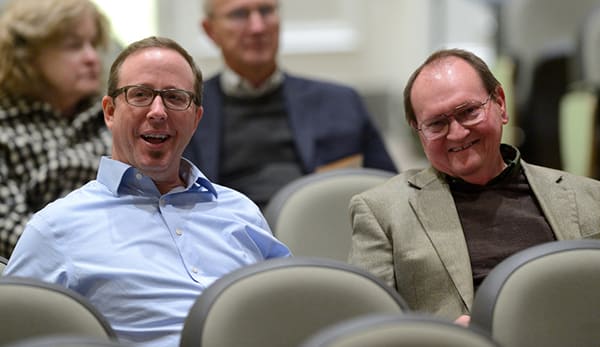
Week Three Update | James G. Thomas, Jr.
Dear Friends,
Thank you so much to the many who have given so far to this fund. To date we’ve raised $18,094 from 129 donors. The campaign, which concludes on May 11, is beginning to wind down. Please consider a gift to honor a great professor, and please share the fund with friends. We have $6,906 to go, and with your help, we can get there.
As many of you know, doing research is central to the work of humanities scholars and social scientists, and despite the increasing amount of material available online today, it is still essential that we go to where the materials are. The Charles Reagan Wilson Grad Student Support Fund helps make this possible.
To a large extent, it is through meticulous research that Southern Studies and history graduate students achieve an understanding of the place in which they live and learn and work. Their strategies include, for example, combing through public and private archival collections, conducting oral histories with people who once experienced (or who are perhaps still experiencing) both important events and everyday life, and exploring historical physical spaces. Scholars dig for the smallest shards of information to help tell the larger, often lost story. A handwritten note buried in an archive can provide a “eureka!” moment, providing us with the clarity to understand not only moments in time, but how and why we’ve arrived at who we are as a society today. A conversation with the participant of a cultural movement or traditional folk practice can complicate our understanding of a particular group’s assumed role or experience. Exploration of a physical landscape can provide a distinctive perspective from which to understand an entirely new topic of inquiry.
Graduate students come to the Center and the history department with a wide array of interests—from roots music to community development to historical preservation to the myriad moments contained within the southern past. Southern Studies and history faculty work with students to foster a deeper critical and intellectual appreciation of those interests and of the subjects they encounter for the first time in classes. Graduate school challenges students to search out that which lies beneath the surface of every topic, to de-simplify traditional understandings of common beliefs, and to present their findings to a broader audience of scholars, peers, and the wider community. Doing good research is part of that process.
But before they hit the road in search of answers to complicated questions, student researchers formulate their ideas in order to define his or her problem. Students come to the Center to learn from some of the most talented and engaged scholars in the fields of sociology, anthropology, southern literature, food studies, documentary studies, and, of course, southern history. On that count, Charles Reagan Wilson is the exemplar of the form. Never content to merely retell the southern past, Charles challenged students to rediscover, recontextualize, and re-center the people, places, and events in southern culture, to create new avenues of understanding not just for themselves but for those who would follow. For Charles, a thesis or dissertation is not simply a means to an end but a contribution to the entire field of southern cultural studies—and to the collective understanding of why southerners do what they do and believe what they believe.
Not all questions need immediate answers. The best questions, in fact, often create more questions. That holds true for doing research, and that holds true for intellectual inquiry. Charles’s classroom counsel rarely began with the words, “I think.” Instead, students who have asked important questions of him likely received the sincere and respectful reply, “Well, tell me first: What do you think?” His task was never to simply teach. His task in the classroom was first and foremost to make students think.
Where the Center faculty and staff were concerned, Director Wilson led by example. Never one to make demands, he gave so much that it was impossible to not return the courtesy by simply doing good work. I myself am grateful to have had the privilege to call Charles a teacher, a mentor, a colleague, and a friend. His guidance in the classroom and in our collaboration to produce the twenty-four volumes of The New Encyclopedia of Southern Culture shaped my understanding of the American South in ways that I continue to deeply appreciate today.
Few observers of the South have had a greater impact on Southern Studies scholarship—or on the scholars who create it—than Charles Reagan Wilson. Let’s continue to repay the courtesy by supporting the Charles Reagan Wilson Grad Student Support Fund today.
Sincerely,
James G. Thomas, Jr.
Associate Director for Publications, Center for the Study of Southern Culture
Enthusiastic #CRWfan
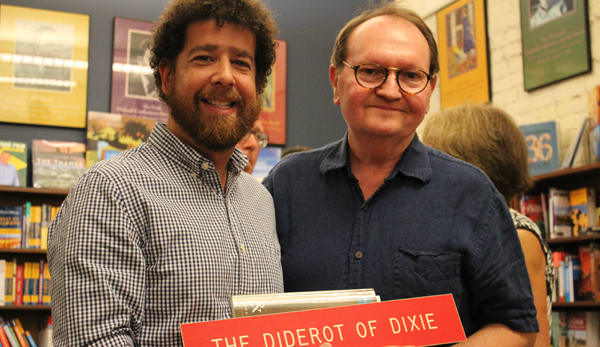
Week Two Update | Becca Walton
Dear Friends,
As we enter the third week of our campaign to raise funds for the Charles Reagan Wilson Graduate Student Support Fund, I want to thank all of you who have given so far. We at the Center have always been proud of our engaged and enthusiastic alumni and friends, and it has been wonderful to see familiar and new names multiplying on the donor wall. With 105 donors, we are now at 66% of our goal of $25,000, with $16,744 raised. There are 16 days left, and I hope you’ll join us in giving a gift if you haven’t yet.
All of us who had the honor of studying with Dr. Wilson learned that passive voice has no place in writing about history. In the Southern Studies M.A. program, and in Dr. Wilson’s regionalism class in particular, I learned the value of scholarship engaged with questions about individual human agency. One of the most important ways for a student to understand history as a complicated web of human interaction is to engage in archival research.
Beginning in college, I had the opportunity to explore archives, first at the University of Virginia, and later in UM Archives and Special Collections. I viewed plantation ledgers in a class about the 19th century South and slavery, read letters written by Eudora Welty to friends, and explored the disturbing files of the Mississippi State Sovereignty Commission. In the archives, distinct voices come to life, and the researcher better understands history in all its complexity, tragedy, and creativity.
We want our students and those in the history graduate program to have access to collections throughout the region and nation, experiencing firsthand the archival resources that can bring to life the individual voices of the American South in its, in the words of James Agee, “six-thousand-mile parade.” We established the Charles Reagan Wilson Graduate Student Support Fund to make this possible, while also honoring a scholar who was so supportive of his students.
I hope you’ll join us in celebrating Dr. Wilson’s teaching legacy with a gift to this fund. Any amount is welcome and very much appreciated.
Best,
Becca Walton
Associate Director for Projects, Center for the Study of Southern Culture
Southern Studies MA Class of 2008
Enthusiastic #CRWfan
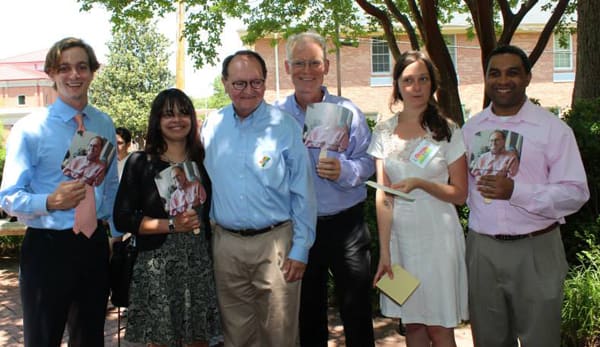
A Message about the Charles R. Wilson Grad Student Support Fund
Dear Friends,
Thank you to all who have given generous gifts of all sizes to the CRW Fund in the first week. Especially meaningful are the gifts from my classmates and all of those who had the opportunity to study with Dr. Wilson. We’re so grateful for the many friends who’ve helped us share the campaign with others who know and love him. With your continued help, we’re confident we can reach $25,000+, which will allow us to endow the fund.
In 2008, I came to the University of Mississippi to pursue a Ph.D. in History largely because of Drs. Ted Ownby and Charles Reagan Wilson. While both of these men have left a tremendous impact on the studies of southern history and the field of southern religion, their academic pedigrees were not the reasons I came to work with them. I came to work with them because of what I had learned about their care for students. These two men had invested heavily in the teachers who trained me. My history professors at Clemson University and the College of Charleston were both products of working with Ted Ownby and Charles Reagan Wilson. Both of these students went on to become professors, important scholars in their fields and received jobs at top academic institutions, yet they also displayed a deep care for their students, they invested in their students and encouraged them to make a difference in the world.
When both of these professors suggested that I attend the University of Mississippi to work with Charles Reagan Wilson I did not hesitate because I knew Charles would be more than an advisor. He would be a mentor. Indeed, he modeled to me what it meant to become a scholar and a servant. I knew I would become a scholar who cared deeply for others, for this world and would be able to use my knowledge and credentials to make a difference in service to my students, to my university, to my state, my nation and to my fellow man. This is the great legacy of Charles Reagan Wilson.
As human beings we are all drawn to certain characteristics. We are drawn to people that have all the accolades, positions, titles, publications, degrees and power. People who have these things have influence and fame in their fields. However, what makes someone truly great is when they have all of those accolades and yet remain humble and continue to serve others in order to make others great. There is something in this marriage of both strength and humility that we are drawn to as human beings. Charles Reagan Wilson is the embodiment of this. His publishing record is beyond question, his teaching, service and impact on the field of southern history and southern religion are remarkable, yet everyone who knows Charles knows him as kind, considerate, thoughtful and caring gentleman. His investment into his students and others around him to make them great is his true legacy. If all scholars thought the way about their responsibilities as Charles does then the academy would be a much more attractive and influential space. Not only would it possess knowledge and research, but its practitioners would be trained to use that knowledge and research for the good of their fellow men and to invest in others. Charles is the epitome of what it means to be a scholar and a gentleman.
I ask that you please consider giving to the Charles Reagan Wilson fund so that we can continue to invest in students who desire to research and teach history while simultaneously investing in others and therefore in our future. We have entered a period in our nation’s history when historical literacy was never more needed yet we are seeing, more and more, a generation growing up that is largely ignorant of our human story. We have entered a period that is looking to science and technology for the answers and there is already heavy financial investment in these fields from a variety of sectors. However, it is the study of history and the humanities that give us the collective wisdom we need as a society to decide how we use this technology and the decisions we make moving forward will deeply impact generations to come. We need to produce more historians and teachers who are trained in the legacy of Charles Reagan Wilson. Men and women who are committed to their discipline, but who also use that position to invest in their students and in their communities.
Would you please consider giving and, in doing so, carrying on Charles’ legacy.
Sincerely,
Otis W. Pickett, Ph.D.
Assistant Professor of History at Mississippi College
Co-Founder of the Prison to College Pipeline Program
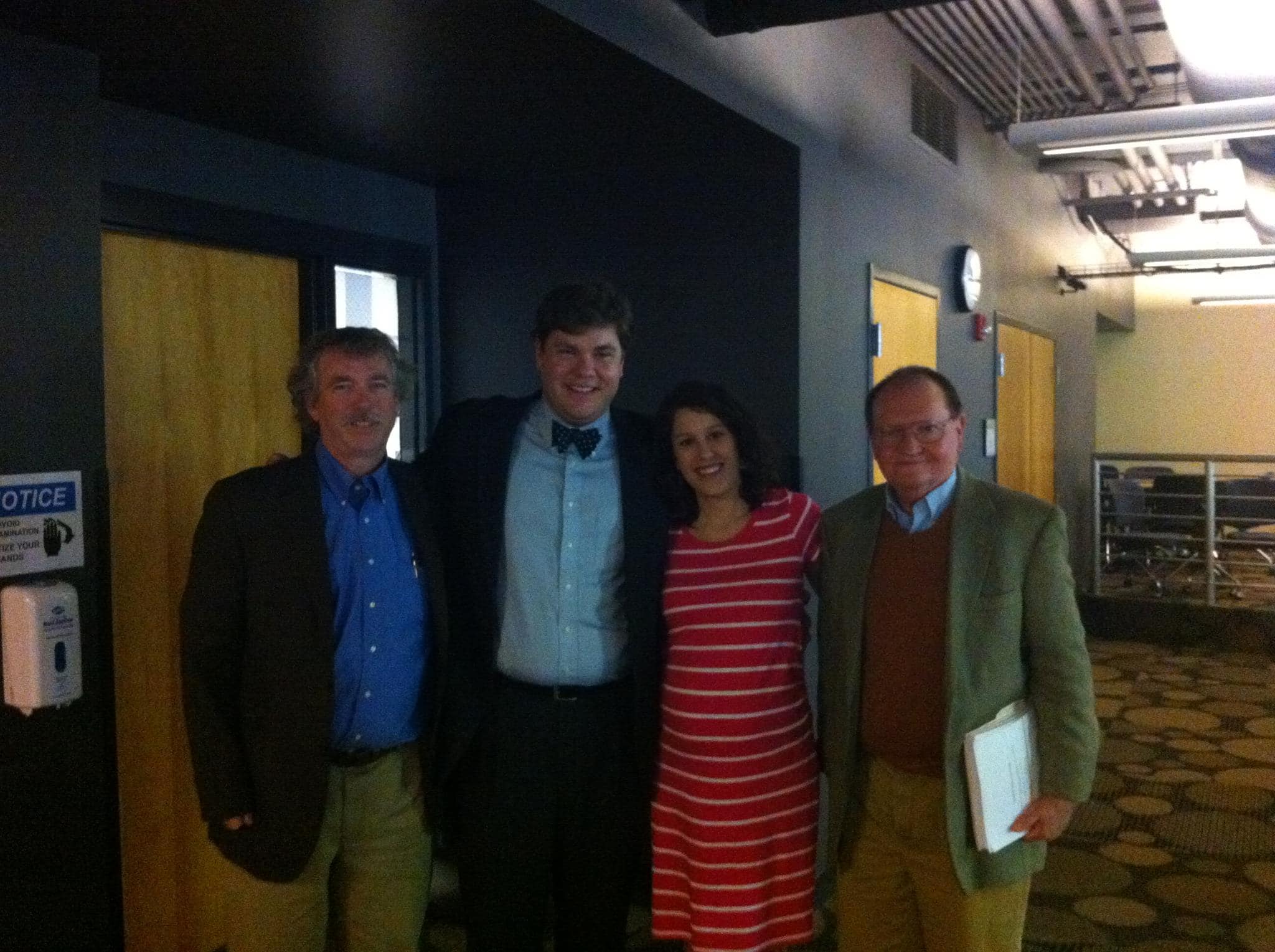
Campaign for the Charles Wilson Fund Launches
Dear Friends,
I encourage you to make a donation to the Charles Reagan Wilson Graduate Student Support Fund. The fund will support research projects for University of Mississippi students studying the American South. Charles Wilson taught History Department graduate students who teach all over the country. In fact, he taught several students who became professors and sent us their own students. He taught hundreds of undergraduates in classes on Southern Studies, Southern History, and Southern Religion. Charles Wilson taught so many Southern Studies graduate students that the Center for the Study of Southern Culture named Room 109, the room where we conduct thesis defenses, the Charles Reagan Wilson Room.
Scholarship. As coeditor (with William Ferris) of the Encyclopedia of Southern Culture and as general editor of the 24-volume New Encyclopedia of Southern Culture, Charles Reagan Wilson was involved in expanding the study of the American South to as many groups, as many experiences, and as many scholarly questions as possible, all the while setting high standards for scholarship and prose. His first book Baptized in Blood: The Religion of the Lost Cause, 1865-1920 was the first scholarly study of its topic. The study of religion became central to Wilson’s research and teaching, and he worked to show connections between the history of religion and subjects ranging from monuments to politics to literature and music, to visual arts and kitschy souvenirs. Wilson’s essay collections, Judgment and Grace in Dixie and Flashes of a Southern Spirit, are insightful works on religion, creativity, and a range of crucial and often surprising topics, and they reveal a South of diverse opinions, experiences, and understandings about the past, present, and future.
Reading. Charles Wilson also set standards for reading and learning for scholarship in many disciplines. Part of his job as encyclopedia editor and editor of the University of North Carolina Press series on New Approaches in Southern Studies was to know who was working on new scholarship. So, he is always reading works not just in his field of history but in literary scholarship, in American Studies, in social science scholarship, and beyond. When some colleagues proposed that we teach a class for undergraduates on interdisciplinary methods, Charles was the first one to teach it. He shows how we can learn in multiple ways and how we can find inspiration inside and far outside academic disciplines.
Teaching. Just as Charles Wilson set high standards for imaginative scholarship and broad thinking, he set standards for good teaching. Charles taught me the significance of listening to students as they discuss their interests, helping them formulate plans about how to reach where they are wanting to go, and setting standards for good research. He has high expectations for careful thinking and clear writing all the while encouraging innovative approaches. It can be easy for faculty members to decide what defines good scholarship and to tell students to go do it. It is harder but far more rewarding to work together with students who want to figure it out themselves, who want high standards rather than rigid rules, and who may or may not want to fit within existing disciplines.
When Charles likes something—a book, an article, an idea, an anecdote—he often says it resonates. Thanks for helping students develop their own resonating ideas.
Sincerely,
Ted Ownby Professor, History and Southern Studies Director, Center for the Study of Southern Culture
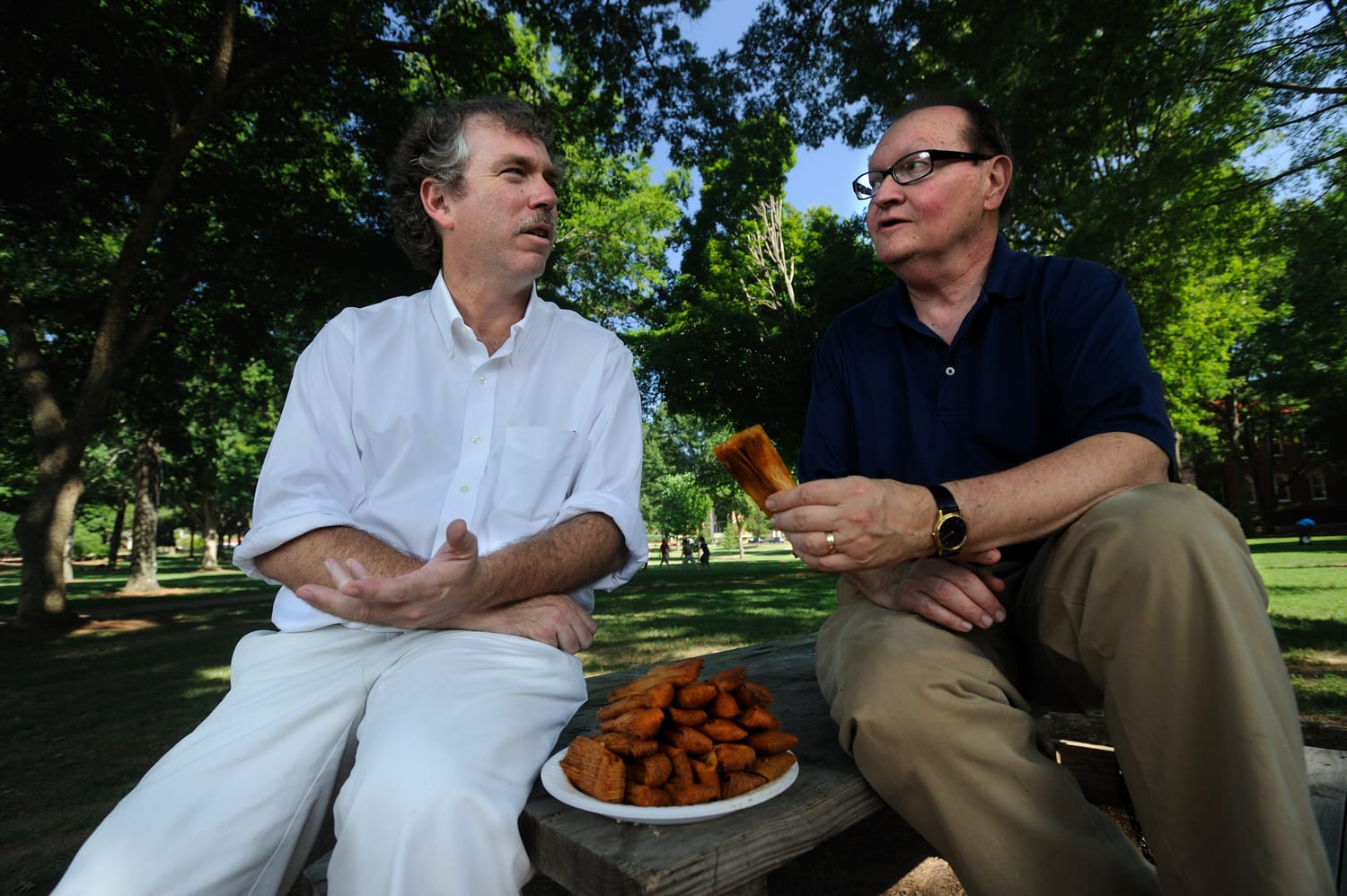
$25
Regionalism Class
Dr. Wilson taught this class for many years, often ending the semester with dinner and class on his deck, with dog Biscuit attending.
$50
Religion in the South Class
Many Southern Studies and history students took this class with Dr. Wilson.
$100
Judgment and Grace in Dixie
Named for Dr. Wilson's 1995 book "Judgment and Grace in Dixie: Southern Faiths from Faulkner to Elvis," which explored popular religion as part of the culture of the modern South.
$150
Ency. of Southern Culture
Named in honor of this 1989 work, edited by Dr. Wilson with Bill Ferris.
$200
Flashes of Southern Spirit
Named in honor of Dr. Wilson's 2011 book, "Flashes of Southern Spirit: Meanings of the Spirit in the U.S. South."
$250
Baptized in Blood Level
Named for Dr. Wilson's 1980 book, "Baptized in Blood: The Religion of the Lost Cause, 1865-1920."
$500
Active Voice
Dr. Wilson is known as a great teacher of writing that demonstrates each individual's agency, thus he allowed no passive voice.
$1,000
Church Fan as Cultural Lens
Dr. Wilson often used the imagery of paper church fans produced by funeral homes and businesses as a way to understand southern culture.

